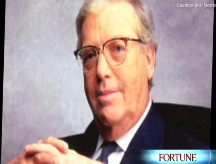The cases against Bear Stearns
A field spotters' guide to the litigation that followed the collapse of the 85-year-old firm.
 |
| Ralph Cioffi, left, and Matthew Tannin face criminal charges over their alleged role in the collapse of two Bear Stearns hedge funds last year. |
NEW YORK (Fortune) -- More than 20 separate lawsuits - many since consolidated - have been filed against Bear Stearns, its board of directors and management. Some of the plaintiffs are ex-employees, like Alex Manos, a 27-year Bear veteran who processed trades at the firm's back-office in Brooklyn. They blame the management and the board for squandering their life savings. Others are from shareholders who believe the same group sold the company too cheaply and under duress. And several more focus on the managers of the two Bear Stearns-affiliated hedge funds that dissolved in the summer of 2007 and first revealed to the world the extent of the toxicity of the mortgage-backed securities manufactured and sold by Wall Street.
Fortunately for former senior Bear executives like Jimmy Cayne, Alan Greenberg and Alan Schwartz, J.P. Morgan Chase (JPM, Fortune 500) agreed to indemnify Bear's officers and directors for six years against these lawsuits. What follows is a rundown of the litigation.
The feds filed this criminal case - including early morning arrests and the requisite perp walk - on June 18 in Brooklyn. The two Bear Stearns hedge fund managers were charged with securities and wire fraud. The indictment alleges that starting in March 2007 Cioffi and Tannin "believed that the Funds were in grave condition and at risk of collapse. Rather than disclosing the true state of the Funds to investors and lenders, thus allowing an orderly wind-down," they "agreed to make misrepresentations in the ultimately futile hope that the Funds' bleak prospects would change." Cioffi was also charged with one count of insider trading for taking out $2 million he had invested in the funds when he allegedly knew they were failing. Attorneys for the two men have said that their clients are innocent and that prosecutors are attempting to make scapegoats of them.
Barclays Bank (BSC, Fortune 500) lent - and then rapidly lost - $400 million to one of the hedge funds, the awkwardly named Bear Stearns High-Grade Structured Credit Strategies Enhanced Leverage Master Fund. Barclays alleges that "from March 2006 into at least mid-June 2007," the defendants "deceived Barclays through a series of targeted misrepresentations" to obtain the bank's initial loan to the fund and then to secure "a doubling" of its commitment in March 2007. Eventually, the management of Bear Stearns, including Cayne and Schwartz, decided to attempt to support the other hedge fund and allow the Enhanced Fund to fail. The loss to investors and Barclays was total. Barclays alleges that the defendants, among other things, repeatedly informed it that the Enhanced Fund's performance was "positive or slightly negative" when in fact the performance in certain months ranged from down 11% to down 38%. Separately, the liquidators of the two hedge funds, in the Cayman Islands, filed a $1 billion lawsuit against the same group of defendants.
The day after the infamous $2-a-share deal between JPMorgan and Bear Stearns, various shareholders filed class action lawsuits against Bear Stearns, its board and executives. The plaintiffs sought to prevent the merger - which closed at the end of May - but they also seek unspecified compensatory damages. At least two other shareholder suits claim breach of fiduciary duty in connection with the merger with JPMorgan and also assert claims for violations of federal securities laws, waste of corporate assets and gross mismanagement, among other alleged wrongdoing. Three other suits allege that in the 15 months before the firm's collapse Bear executives and directors "issued materially false and misleading statements regarding the Company's business and financial results and that as a result.... [Bear's] common stock traded at artificially inflated levels."
A Beverly Hills billionaire, H. Roger Wang, claimed his Bear broker in Los Angeles encouraged him to buy the company's stock in mid-March - as it was falling - because it must be a great deal. Wang bought 150,000 Bear Stearns shares - at a cost of around $6.5 million. He alleges the firm then improperly sold the stock on March 18 for $6.32 per share, a little less than $950,000.
A handful of former employees who were investors in the Bear Stearns' Employee Stock Ownership Plan (ESOP) allege that senior Bear executives, among others, breached their fiduciary duties by failing, among other things, to prudently manage the ESOP's investment in Bear stock and inform employees about the risk of that investment.
One lawsuit already disposed of involves Bear Stearns as the plaintiff. It sued Douglas A. Sharon, one of the firm's star brokers in Boston. Sharon resigned on March 17 - the morning after the $2 deal was reached with JPMorgan - to re-establish himself and about $1 billion of his clients' money at Morgan Stanley (MS, Fortune 500). Bear claimed Sharon had failed to give required notice before leaving and alleged he had "printed out piles of confidential and proprietary documents."
On March 27, U.S. District Judge Nathaniel M. Gorton granted Bear's request for a temporary restraining order preventing Sharon from working at Morgan Stanley. But a week later, Gorton lifted the order saying it would prevent the broker from advising "his clients in times of economic turmoil." Gorton found no evidence that Sharon improperly solicited clients or employees. The case is in arbitration.
Sharon, whom Jimmy Cayne personally hired, says he bears no ill will toward the firm or Cayne. "There was no instance in my 20-year career where Jimmy didn't always make himself available and happily," Sharon says. "If in the last few years, he slowed down and wanted to play some golf, who can begrudge him that? He loved being in the game and to suggest otherwise is ridiculous. The guy had Bear Stearns in his blood."
More on Cayne and the demise of Bear Stearns:
-
 The retail giant tops the Fortune 500 for the second year in a row. Who else made the list? More
The retail giant tops the Fortune 500 for the second year in a row. Who else made the list? More -
 This group of companies is all about social networking to connect with their customers. More
This group of companies is all about social networking to connect with their customers. More -
 The fight over the cholesterol medication is keeping a generic version from hitting the market. More
The fight over the cholesterol medication is keeping a generic version from hitting the market. More -
 Bin Laden may be dead, but the terrorist group he led doesn't need his money. More
Bin Laden may be dead, but the terrorist group he led doesn't need his money. More -
 U.S. real estate might be a mess, but in other parts of the world, home prices are jumping. More
U.S. real estate might be a mess, but in other parts of the world, home prices are jumping. More -
 Libya's output is a fraction of global production, but it's crucial to the nation's economy. More
Libya's output is a fraction of global production, but it's crucial to the nation's economy. More -
 Once rates start to rise, things could get ugly fast for our neighbors to the north. More
Once rates start to rise, things could get ugly fast for our neighbors to the north. More












